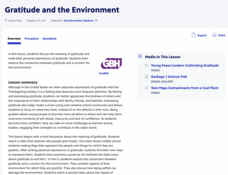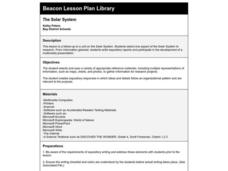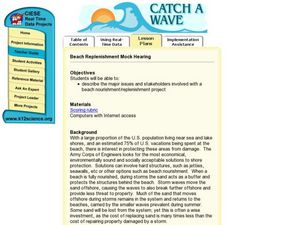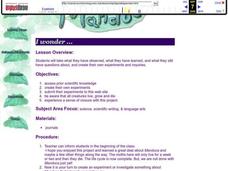Learning Games Lab
Controlling Water Activity in Food
Food storage matters! Scholars learn how the amount of water in corn can affect its rate of spoilage. They create a control group, then test three corn samples stored in three different locations for water activity. As a result of the...
Learning Games Lab
How to Use Oil Immersion Microscope
Teach the class how to use a microscope to identify bacteria in food. Scholars explore the different parts of the microscope and learn how to determine total magnification. They walk step-by-step through the procedure of preparing slides...
Learning Games Lab
The pH Scale and Meter Calibration
What are the different ways to test for pH? First, scholars explore the pH scale and a common way to test for acidity and alkalinity. Then, they learn about the importance of pH in food safety and why variance in pH could potentially...
Learning Games Lab
Testing and Adjusting pH
Pupils learn how to control food spoilage by adjusting the food's pH. They see that one of the most dangerous bacteria can grow in food if people don't handle and store food properly. Using knowledge of the bacteria's preferred pH,...
California Department of Education
Slap Tubes, Flutes, and Xylophones: The Physics of Pipe-Based Instruments
It's the encore to a wave unit. Individuals build either a slap tube, flute, or xylophone as a culminating activity for a physics unit on waves. Scholars calculate the lengths of pipes needed to produce the specific notes for their...
iCivics
Step One: We've Got Issues
What is the most pressing issue in your community? The resource helps you and your middle schoolers begin the process of doing something about it! Learners compare and contrast two pressing issues in their local counties by reading two...
PBS
Gratitude and the Environment
A class discussion begins a two-part lesson about gratitude and the environment. In part one, learners watch a video then share their feelings about its most memorable moment. Delving deep into the meaning of gratitude, scholars create...
Curated OER
Science Unit Lesson Five
Sixth graders review how and which plants operate in terrariums. In groups, they follow instructions to make their own terrarium and place different types of plants in it. To end the lesson, they review the steps in the water cycle and...
Curated OER
Construction of Food Chains and Tracing Energy Changes
If you need a few basic activities for teaching food chains to your emerging ecologists, here they are. Three sheets of organism cards are included for learners to cut out and arrange according to trophic relationships. To make the most...
Curated OER
Populations
Take your ecology aces out in the field to practice population counts and model the benefits of camouflage. Though not particularly exciting, these activites and the assessments that are also included are practical and applicable to your...
Curated OER
Genetically Modified Foods in Perspective
Students research the concept of genetically modified foods. The purpose of the research is to increase science content knowledge and comprehension of the controversy surrounding the subject.
Curated OER
The Scientific Method
Students study the steps involved in the scientific method. They apply the scientific method to their science fair projects.
Curated OER
HIV Prevention
Seventh graders engage in critical thinking skills about personal health and safety to prevent the acquiring of the HIV disease. The project is an extension of this thinking designed for students to think about all the different ways...
Curated OER
3-D Cell Model
Life science laureates choose a plant or animal cell to construct a model of as an at-home project. This handout provides guidelines, suggested materials, and a grading rubric for their reference. A full-page letter to parents is also...
Curated OER
The Solar System
Looking for a cross-curricular project for language arts and science? Use this lesson to reinforce knowledge of the Solar System, as well as expository writing skills. Elementary and middle schoolers choose one aspect of the Solar System...
National Energy Education Development Project
Exploring Hybrid School Bus Technology
The color School Bus Yellow was created in 1939 because science had proven peripheral vision detects yellow 1.24 times faster than other colors. Young scientists explore modern school bus transportation options and then discuss the types...
Curated OER
Investigate Pine Creek!
Students are invited to become detectives in this Web-Integrated Science Environment (WISE) as they explore a local creek, its environment and ongoing status. Students participate in field trips, acquisition of data through water testing...
Curated OER
It's not as pretty as it looks!
Tenth graders investigate that measurement is often an inact science. They explore ways utilize available information to form hypotheses. Students investigate how to test hypotheses using the HACH test kits.
Scholastic
On or Off?
How does electricity work? Put an electric circuit into your own hands with a short experiment that makes a switch out of a battery, light bulb, and thumb tacks. Young scientists then respond to short answers about why the circuit works.
Curated OER
Beach Replenishment Mock Hearing
Young scholars study the issues and stakeholders involved in a beach replenishment project. In this beach replenishment instructional activity, students study the point of views for the various stakeholders in a beach replenishment...
Curated OER
Stereochemistry Problem Set 9
In this chemistry worksheet, students write how many chiral C's are in each of the compounds listed. Then they draw the Fischer projections for all stereo isomers in 5 and in 6. Students also match the correct Fischer projection to each...
Curated OER
Our Environment
Students examine the world's environmental dilemmas and create project depicting how to improve the environment. They study ten endangered species.
Curated OER
I Wonder...
Pupils review information they have gathered from previous lessons. They create their own experiments and carry them out. They reflect on the project as a whole.
Curated OER
Impact of Inventors
Learners examine the impact of inventors on our world. In this science instructional activity, students are given a time line of the invention of familiar objects. Learners then evaluate some kid inventors and decide if they would make...
Other popular searches
- 4th Grade Science Project
- Physical Science Projects
- Science Project on Pulleys
- Science Project Volcano
- Science Project Gravity
- Science Project Ideas
- Forensic Science Project
- Science Fair Project Ideas
- Rock Science Project
- Science Project Food
- Science Project Terrarium
- Science Fair Project Data

























